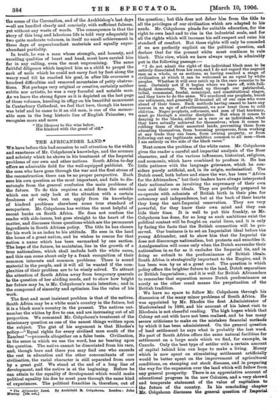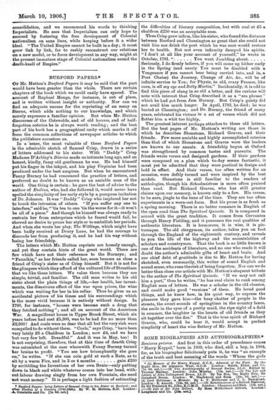THE AFRICANDER LAND.*
WE have before this had occasion to call attention to the width and exactness of Mr. Colqnhoun's knowledge, and the acumen and sobriety which he shows in his treatment of the Imperial problems of our own and other nations. South Africa to-day offers an admirable field for the well-equipped publicist. To the men who have gone through the war and the first stress of the reconstruction there can be no proper perspective. Each sees his own question as the most important, and fails to dis- entangle from the general confusion the main problems of the future. To do this requires a mind from the outside which can not only look at the situation with a certain freshness of view, but can apply from its knowledge of kindred problems elsewhere some true standard of comparison. Mr. Colquhoun has written the most helpful of recent books on South Africa. He does not confuse the reader with side-issues, but goes straight to the heart of the matter, and discusses those questions which are the permanent ingredients in South African policy. The title he has chosen for his work is an index to his attitude. He sees in the land the home of a great nation, and he wishes to rescue for that nation a name which has been earmarked by one section. The hope of the future, he maintains, lies in the growth of a true nationalism, which shall include both the white races, and this can come about only by a frank recognition of their common interests and common problems. There is sound material in the people, and it will all be wanted if the com- plexities of their problem are to be wisely solved. To attract the attention of South Africa away from temporary quarrels to the question of her abiding needs, and to show how bright her future may be, is Mr. Colquhoun's main intention; and in the compound of sincerity and optimism lies the value of his work.
The first and most insistent problem is that of the natives. South Africa may be a white man's country in the future, but it is a black man's country in the present. The natives out- number the whites by five to one, and are increasing out of all proportion. We commend Mr. Colquhoun's treatment of the missionary question as one of the sanest things written upon the subject. The gist of his argument is that Rhodes's policy—" Equal rights for every civilised man south of the Zambesi "—proceeds altogether on a false basis. Civilisation, in the sense in which we use the word, has no bearing upon the question. The native cannot be dissociated from his race, and, though here and there you may find one who exceeds the rest in education and the other concomitants of our civilisation, the racial character is still separated from ours by a great gulf. We stand at the end of a long line of development, and the native is at the beginning. Before he can attain to the equality of development which would make political equality his due he must pass through the same kind of experiences. The political franchise is, therefore, out of * The Africander Land. By Archibald B. Colquboun. London : John Murray. Ma. net.] the question ; but this does not debar him from the title to all the privileges of our civilisation which are adapted to his needs. Mr. Colquhoun pleads for suitable education, for the right to own land and to rise in the industrial scale, and for all the rights which will increase his self-respect and raise his
standard of comfort. But these rights will only be conceded
if we are perfectly explicit on the political question, and declare that for the present white must continue to rule
black. This view, which we have always urged, is admirably put in the following passage :—
"I do not admit the right of the individual black man to be entirely dissociated from his race, and I do not regard the negroid race as a whole, or as sections, as having reached a :stage of civilisation at which it can be welcomed as an equal by white peoples. Whether it will ever catch up in the race remains to be seen. Certainly not if it begins where we leave off, with full- fledged democracy. We worked up through our patriarchal, tribal, communal, feudal, municipal, and constitutional stages, and they have to do the same. We murdered our prophets, burnt our reformers, and generally ill-treated all of our race who were ahead of• their times. Such methods having ceased to have any terrors in an age of advertisement, we now treat them to cold oblivion. Negro prophets, reformers, and men of that tendency, must go through a similar discipline. But when it comes to denying to the blacks, either as a race or as individuals, what they have actually achieved for themselves ; when it comes to robbing them of their ancestral lands, preventing them from educating themselves, from becoming prosperous, from working at any trade they can learn, from owning property, or from following out any legitimate ambitioa common to all men—then I am entirely on the side of the black races."
Next comes the problem of the white races. Mr. Colquhoun gives the reader a careful and impartial analysis of the Boer character, and of the various influences, historical, religious, and economic, which have combined to produce it. He has little patience with the language grievance, which he con- siders purely artificial, and, in its origin, ecclesiastical. The Dutch creed, both before and since the war, has been "Africa for the Africanders," but their leaders have always interpreted their nationalism as involving the supremacy of their own
race and their own ideals. They are perfectly prepared to co-operate with colonists of British birth in their plea for autonomy and independence, but at the back of their hearts
they keep the anti-Imperial reservation. They are very powerful, for they know their own mind and they can bide their time. It is well to put this frankly, as Mr. Colquhoun has done, for so long as such ambitions exist the political contest will be fought on racial lines, and it is only by facing the facts that the British connection will be pre- served. Our business is to set an Imperialist ideal before the young Africander, and to show him that the Imperial tie does not discourage nationalism, but protects and ennobles it. Amalgamation will come only when the Dutch surrender their nationalism in so far as it excludes the Imperial tie, and in doing so submit to the predominance of British ideals. South Africa is strategically important to the Empire, and it has been won by us at a great cost. The question is which policy offers the brighter future to the land, Dutch separatism or British Imperialism; and it is well for British Africanders to remember that separation means Dutch predominance as surely as the other creed means the perpetuation of the British tradition.
• We have no space to follow Mr. Colquhoun through his discussion of the many minor problems of South Africa. He was appointed by Mr. Rhodes the first Administrator of Mashonsland in 1890, and his account of his latest visit to Rhodesia is not cheerful reading. The high hopes which that Colony set out with have not been realised, and he has many severe criticisms to make on the mistaken financial methods by which it has been administered. On the general question of land settlement he says what is probably the last word.
No part of South Africa offers the same natural facilities for settlement on a large scale which we find, for example, in Canada. Only the best type of settler with a certain amount of capital behind him can hope to make a living. Money which is now spent on stimulating settlement artificially would be better spent on the improvement of agricultural conditions, on stamping out stock diseases, and in preparing the way for the expansion over the land which will follow from
any general prosperity. There is an appreciative account of educational progress in the new Colonies, and a very shrewd and temperate statement of the value of capitalism to the future of the country. In his concluding chapter Mr. Colquhoun discusses the general question of Lnperial consolidation, and we recommend his words to thinking Imperialists. He sees that Imperialism can only hope to succeed by fostering the free development of Colonial nationalism on sane lines, while keeping before it a wider ideaL "The United Empire cannot be built in a day ; it must grow link by link, for to rashly reconstruct our relations on a new model, or to force development in any way, might at the present immature stage of Colonial nationalism sound the death-knell of Empire."











































 Previous page
Previous page